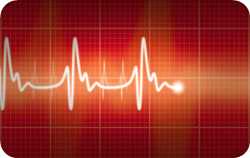3.3.3 Cardiac rhythm disorders – QT interval prolongation
Antipsychotics can prolong the QT interval1, which can result, rarely, in ventricular tachyarrhythmias such as potentially life-threatening torsades de pointes and sudden death. Significant prolongation of the QT interval may result in serious cardiac events such as a cardiac arrest during exertion or even during sleep. The condition might also manifest as sudden and transient loss of consciousness (syncope).
Antipsychotics vary in their arrhythmogenic effect; evidence for the risk of cardiotoxicity is most robust for haloperidol and pimozide; there is also evidence of risk with amisulpride, benperidol, chlorpromazine, clozapine, fluphenazine, flupentixol, levomepromazine, olanzapine, quetiapine, risperidone, sulpiride, trifluoperazine, and zuclopenthixol. There is insufficient information for the remaining antipsychotics.
Factors which increase risk
Risk factors for ventricular arrhythmias include
- congenital QT interval prolongation or history of arrhythmias
- family history of QT interval prolongation or sudden unexplained cardiac death
- bradycardia (heart rate less than 55 bpm)
- electrolyte imbalance (particularly hypokalaemia or severe hypomagnesaemia), or concomitant use of medicines that affect electrolytes (especially diuretics, but also others such as amphotericin and corticosteroids2)
- advancing age and female gender
- concurrent use of a medicine that prolongs the QT interval or is likely to produce pronounced bradycardia
- cardiac disorders (eg recent myocardial infarction and congestive heart failure) The probability of QT-interval prolongation is raised if the antipsychotic is given intravenously or at an excessive dose or if high doses of two or more antipsychotic drugs are used concurrently.
Risk-reduction measures
Patients should be questioned about the use of medicines and of any other substances which could prolong the QT interval or interact with current therapy.
In patients at particular risk of QT-interval prolongation (see above), antipsychotic drugs should be either avoided (especially haloperidol and pimozide) or used with caution and after assessing the ECG and plasma electrolytes; patients should continue to be monitored for ECG changes and for signs and symptoms of arrhythmias during treatment. ECG assessment is also of value when increasing the dose of the antipsychotic.
All patients and carers should be asked to report promptly symptoms such as palpitations, feeling dizzy or fainting; ECG should be obtained for these patients and they should be assessed for any signs and symptoms of arrhythmias. All patients should also be advised to seek medical help in case of illnesses such as gastroenteritis or introduction of diuretic treatment, because they can cause hypokalaemia and increase the susceptibility to arrhythmias.
Treatment
Significant QT interval prolongation calls for stopping the offending medicine and seeking specialist cardiology advice; any electrolyte imbalance should be corrected. If torsades de pointes or another ventricular arrhythmia is identified, emergency treatment must be instituted.
- The period between the start of the QRS complex (on an electrocardiogram [ECG]) to the end of the T wave. Prolongation of the QT interval is associated with potentially very serious rhythm disorders such as torsades de pointes↩
- Substances that mimic effects of hormones produced by the adrenal cortex. The term corticosteroids covers glucocorticoids (steroids which reduce inflammation) and mineralocorticoids (steroids which act on the kidneys to retain sodium and water and promote excretion of potassium)↩
